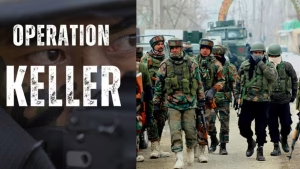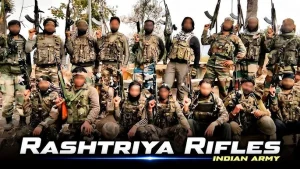New Delhi – In a significant development in India’s counter-terrorism efforts, the Indian Army launched Operation Keller on May 13, 2025, in Jammu and Kashmir’s Shopian district. The operation, which resulted in the elimination of three terrorists affiliated with the Lashkar-e-Taiba (LeT) outfit, comes amid the ongoing Operation Sindoor aimed at combating Pakistan-backed terrorism in the region. Operation Keller was meticulously executed based on specific intelligence gathered by a Rashtriya Rifles Unit about terrorist presence in the general area of Shoekal Keller.
Operation Keller: Origins and Execution

Operation Keller was officially launched at approximately 12:50 PM on Tuesday, May 13, 2025. The Indian Army, acting on precise intelligence inputs, initiated a search and destroy mission in the Shoekal Keller area of Shopian district. According to official communications from the Indian Army’s social media handles, the operation swiftly escalated into a fierce firefight when the terrorists opened heavy fire on the security forces.
The Rashtriya Rifles Unit, known for its specialized counter-insurgency operations, spearheaded Operation Keller. This unit’s expertise in gathering ground intelligence proved crucial in locating the terrorists’ hideout. The operation’s success highlights the effectiveness of the Indian Army’s intelligence network and rapid response capabilities in the Kashmir Valley.
Also Read: S Jaishankar Security Enhancement: Delhi Police Boosts Protection Following MEA Alert
Key Terrorist Eliminations in Operation Keller


Among the three terrorists neutralized during Operation Keller, one has been identified as Shahid Kuttay, a top commander of the Lashkar-e-Taiba terrorist organization. According to senior police officials, Kuttay was categorized as an “A” category terrorist, indicating his high-value status in the terrorist hierarchy. The second terrorist has been identified as Adnan Shafi, while the identity of the third terrorist remains under verification.
Profile of Shahid Kuttay
Shahid Kuttay, a resident of Shopian’s Chotipora Heerpora area, had joined terrorist ranks in 2023 and had quickly risen to become a top LeT commander. His elimination during Operation Keller marks a significant blow to the terrorist network operating in South Kashmir. According to security officials, Kuttay was involved in numerous terrorist activities and anti-national operations in the region.
Most notably, Kuttay played a role in the murder of a BJP sarpanch at Heerpora on May 18, 2024, highlighting the targeted killings of political workers by terrorist groups in the Valley. Following the devastating April 22 terror attack in Kashmir’s Pahalgam that resulted in the deaths of 26 people, mostly tourists, authorities had razed Kuttay’s residence on April 26 as part of their counter-terrorism measures.
Operation Keller in the Context of Broader Counter-Terrorism Efforts
Operation Keller is part of India’s intensified counter-terrorism efforts in Jammu and Kashmir, coming on the heels of the ongoing Operation Sindoor. These operations reflect the Indian security establishment’s renewed focus on eliminating terrorist infrastructure and neutralizing high-value targets in the region.
The successful execution of Operation Keller demonstrates the Indian Army’s commitment to maintaining pressure on terrorist organizations and their networks. By targeting key commanders like Shahid Kuttay, the security forces aim to disrupt the command structure of these groups and prevent them from planning and executing attacks against civilians and security personnel.
Strategic Significance of Operation Keller
The timing and execution of Operation Keller carry significant strategic importance. Following the Pahalgam attack that targeted tourists and civilians, the Indian security forces have stepped up their counter-terrorism operations across Jammu and Kashmir. Operation Keller represents a continuation of this strategic offensive against terrorism in the region.
The selection of Shopian district for Operation Keller is also noteworthy. Shopian has historically been a hotbed of terrorist activity, serving as a stronghold for various terrorist organizations. By conducting Operation Keller in this area, the Indian Army is directly challenging the terrorists in one of their perceived safe zones, sending a clear message about the reach and resolve of India’s counter-terrorism apparatus.
Technological and Tactical Aspects of Operation Keller
While specific details of the tactical execution of Operation Keller remain classified for security reasons, the operation likely incorporated advanced surveillance technologies and modern warfare tactics that the Indian Army has been increasingly deploying in counter-terrorism operations.


The Rashtriya Rifles, which led Operation Keller, is known for its specialized counter-insurgency training and equipment. Their ability to gather precise intelligence and execute rapid search operations has been crucial to the success of operations like Operation Keller. The unit’s familiarity with the local terrain and population also plays a vital role in minimizing civilian casualties while maximizing operational effectiveness.
Impact on Terrorist Networks in Kashmir
The elimination of three terrorists, particularly a top commander like Shahid Kuttay, during Operation Keller is expected to significantly disrupt LeT’s operational capabilities in South Kashmir. Intelligence reports suggest that Kuttay was involved in recruiting local youth into terrorist ranks and planning attacks against security forces and civilians.
By targeting leadership figures through operations like Operation Keller, the security forces aim to create a leadership vacuum within terrorist organizations that is difficult to fill. This strategy has proven effective in the past, with terrorist groups often struggling to maintain operational cohesion following the loss of experienced commanders.
Local Reactions to Operation Keller
The local population’s response to Operation Keller reflects the complex socio-political dynamics of Kashmir. While many residents express relief at the elimination of terrorists responsible for civilian killings and disturbances, others remain concerned about the broader impact of military operations on daily life.
The Indian Army has been increasingly focusing on winning hearts and minds alongside military operations like Operation Keller. This dual approach aims to ensure that counter-terrorism efforts receive public support, which is crucial for gathering intelligence and isolating terrorists from the local population.
Future Implications of Operation Keller
Operation Keller sets an important precedent for future counter-terrorism operations in Jammu and Kashmir. Its success validates the intelligence-driven, targeted approach that security forces have been refining in recent years. As terrorist groups adapt their tactics, operations like Operation Keller demonstrate the Indian security establishment’s ability to evolve their counter-measures accordingly.
Security analysts predict that following Operation Keller, terrorist groups may temporarily reduce their visible activities as they reassess their strategies. However, history suggests that they may attempt retaliatory attacks to maintain relevance and boost morale among their ranks. Security forces are likely to remain on high alert for such possibilities in the aftermath of the operation.
Closing Remarks: The Significance of Operation Keller in India’s Counter-Terrorism Strategy
This operation represents another significant milestone in India’s ongoing counter-terrorism efforts in Jammu and Kashmir. By successfully eliminating three terrorists, including a top LeT commander, the operation has struck a blow against terrorism in the region. As part of a broader strategy that includes Operation Sindoor, this operation demonstrates India’s commitment to rooting out terrorism and ensuring security for its citizens.
The operation’s success can be attributed to precise intelligence gathering, rapid deployment, and effective tactical execution by the Rashtriya Rifles. As the situation in Kashmir continues to evolve, operations like these will remain crucial components of India’s security strategy, combining military action with broader efforts to address the underlying factors that contribute to terrorism in the region.
As this operation concludes its active phase, the Indian security establishment will undoubtedly analyze its outcomes to further refine their counter-terrorism approach, ensuring that future operations maintain the high level of effectiveness demonstrated in Shopian on May 13, 2025.

